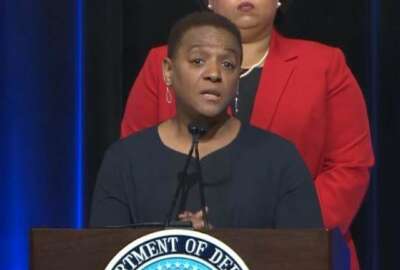
Here’s what federal agencies say they need to fight the coronavirus
Federal agencies have requested an additional $45.8 billion in funding for 2020 alone, which the White House said is necessary for its governmentwide response to...
It turns out federal agencies need a lot more resources to scale up and support large-scale telework for their employees to respond to the rapidly evolving coronavirus pandemic.
Extra telework support is at the top of the list for many, and it’s part of a $45.8 billion request the White House made Tuesday to Congress for additional 2020 funding.
Agencies are asking for billions of dollars in extra cash this year, which would, in part, address growing technology, workforce and resources needs associated with the coronavirus.
“With the pandemic growing, resource needs have also grown,” Russ Vought, acting director for the Office of Management and Budget, wrote in a letter to Congress. “The unprecedented mobilization the administration has achieved has forced agencies to incur unanticipated costs. These costs must be met with a legislative response to ensure full operational capacity.”
President Donald Trump on Wednesday formally nominated Vought to be the permanent OMB director.
Vought’s funding request also includes an advanced appropriation for the Centers for Disease Control and Prevention for fiscal 2021. The goal, he said, is to make some $8.3 billion available to the CDC as soon as the new fiscal year starts Oct. 1, so there’s no delay in funding the agency if Congress can’t agree to a governmentwide spending package at the year-end deadline.
The new funding request also includes $8.3 billion for the Defense Department’s emergency response fund. The Pentagon would need additional authorities to transfer those funds to other DoD accounts, Vought said.
“The request includes resources to facilitate changes in servicemember personnel policy, expedite access to rapid COVID-19 diagnostics, ensure access to medical care, including additional medical countermeasures, address the impacts of the pandemic on logistics and supply chains, including pharmaceuticals and personal protective equipment, and bolster the overall national response,” the request reads.
Besides the Pentagon, more than 20 other agencies have asked for additional funding to help them better respond to the coronavirus. Here are some highlights.
Agriculture Department
USDA’s Food Safety and Inspection Service is looking for $33 million to pay temporary and intermittent employees and overtime inspector costs. Funding would also go toward the temporary relocation of inspectors, which suggests USDA may need to move its employees to deal with potential staffing shortages due to the coronavirus.
The Farm Service Agency also needs more funding to support overtime and temporary staffing costs, due to the “increased volume of loan servicing and processing of new applications in response to coronavirus.”
In addition, the Foreign Agricultural Service asked for more funding to repatriate 110 officers and 300-to-350 dependents back from overseas posts and house them in temporary quarters for three months, according to the request.
Energy Department
The Energy Department requests $28 million in additional fiscal 2020 funding. The majority of that funding would go toward “additional information technology requirements and telework support, also including increased cybersecurity costs, in response to coronavirus.”
Environmental Protection Agency
The Environmental Protection Agency requests $1 million for its Hazardous Substance Superfund program to purchase additional software licenses and Virtual Private Network licenses “to allow large scale telework.”
The agency has also requested a total of about $4 million to disinfect and clean agency-owned and -leased spaces.
Education Department
The Education Department requests $10 million to support extended telework.
“This request would support additional network bandwidth and capacity for approximately 5,000 staff to work remotely simultaneously as well as additional mobile devices (such as phones and tablets) to support maximum telework.”
The funding would also go toward funding for additional contractor support “should Federal staff become medically incapacitated due to COVID-19.”
General Services Administration
The General Services Administration requested nearly $19 million in additional funding to provide governmentwide IT solutions such as Digital Signature, VPN, security testing and website support.
“Funding is also needed to support increased call volume and online outreach to GSA’s USAGov Contact Center and internal IT support for remote operations and COVID-19 response effort,” the request reads.
Department of Health and Human Services
The Department of Health and Human Services’ many components are looking for billions of dollars in additional research, vaccine development and operational funding.
The Indian Health Service needs extra telework support.
The request also includes an undetermined amount to stand up the Commissioned Corps Officer Ready Reserve, which the administration said would provide surge capacity for the coronavirus response.
The HHS Office of Inspector General is looking for extra funding to respond to additional IT challenges.
Finally, HHS is seeking a temporary exemption from the General Schedule pay limits for the department’s employees who are part of the coronavirus response.
Department of Homeland Security
Most DHS components are looking for six months worth of protective gear for their employees, according to the request.
The Transportation Security Administration needs millions of dollars for protective gear for its officers, as well as additional explosive trace detection swabs and sanitation supplies.
The Federal Emergency Management Agency is seeking more funding for expanded conference bridge capabilities, cybersecurity and virtual private networks. FEMA also requested $2 billion for state and local coronavirus response.
In addition, the department said it needs overtime and premium pay for its workforce.
Interior Department
The Interior Department said it needs additional funds for network security upgrades, which should reduce potential cybersecurity risks.
Several Interior bureaus requested extra cash for overtime and hazard pay for their employees, as well as additional telework and IT support.
Both the Bureau of Land Management and the National Park Service asked for millions of extra dollars for the “cleanup of thousands of facilities, redeployment and overtime for law enforcement officers and emergency personnel, information and technology and telework needs and quarantine costs (e.g., for employees who are mandatory occupants) in response to coronavirus.”
Labor Department
The Labor Department requests $12 million to implement the Families First Coronavirus Response Act, which establishes emergency paid leave for American workers that have tested positive for the coronavirus or is caring for another person with the virus.
National Archives and Records Administration
The National Archives and Records Administration requests $8.2 million in supplemental funding.
The agency would spend $5.5 million to “provide electronic remote access to all NARA employees, including hardware and accelerating cybersecurity improvements.”
NARA also requests $2.7 million to cover cost savings projects it expected to complete this year, but won’t because of the coronavirus pandemic. Those cost savings were expected to come from decreased maintenance, physical consolidation of records and migrating presidential records to the cloud.
Office of Management and Budget
The Office of Management and Budget has asked for $3 billion to create a new “unanticipated needs” account.
The account would be modeled after similar ones created during the aftermath of the Sept. 11 attacks and the 2000 IT conversion.
Specifically, it would give the OMB director the authority to transfer funds to other agencies and departments as needed for coronavirus response efforts. Funds would be available after congressional notification, OMB said.
Office of Personnel Management
Like other agencies, the Office of Personnel Management needs additional telework support.
In addition, the agency is asking for $12 million for “digital case management, short-term methods to allow electronic submissions of retirement application packages in support of OPM’s current paper-based business operations, and increased telecommunications, in response to coronavirus,” according to the request.
OPM’s current retirement claims process is still mostly paper-based.
Small Business Administration
The Small Business Administration requested $2 million for its salaries and expenses account for additional IT requirements and telework support.
The agency also requests $562 million for its disaster loans program account. The funding would cover administrative expenses for processing the existing Disaster Loans Program subsidy and indirect overhead costs linked to the coronavirus response.
Social Security Administration
The Social Security Administration said it needs $25 million for additional phone and communication services so its employees can continue to serve the public.
The agency also asked for an extra $20 million in overtime and workload costs.
State Department
The State Department requested $115 million in additional funding, and is prepared to bring home a tenth of its workforce from foreign posts.
The agency requests $25 million to support “voluntary departure and curtailment on a global basis” of vulnerable employees, which would mean shortening an employee’s tour of duty from their assignment.
The funding request assumes the agency will have a 10 percent curtailment rate.
The agency also requests $30 million for its Bureau of Medical Services to provide emergency post support and personal protective equipment stockpiles to assignments both domestically and overseas.
The agency also requests $60 million for its Consular and Border Security Programs to address declining visa revenues.
Transportation Department
The Transportation Department requested $2 million in additional fiscal 2020 funding for extra bandwidth and access to its network, VPN licenses and contractor helpdesk support.
“DoT also anticipates a loss in revenue if DoT HQ is completely teleworking at approximately $135,000 per month based on 850 employees who park at the New Jersey Avenue HQ building,” the request reads.
Treasury Department + IRS
The IRS has asked for $241 million “to improve taxpayer services for the extended filing season and new tax credit questions, provide taxpayers with new forms and information online for new credits, implement a manual process for the proposed paid leave tax credit, and enhance IRS information technology capacity to respond and interact with taxpayers.”
Under President Donald Trump’s national emergency declaration, the IRS will allow taxpayers and businesses to delay paying their 2019 tax bills for 90 days past the usual April 15 deadline.
Taxpayers will still have to file their tax returns by the April 15 deadline, the Associated Press reports, but won’t have to pay their tax bill for 90 additional days.
During that time, individuals and corporations will not be subject to interest or penalty payments.
Department of Veterans Affairs
The Veterans Health Administration has asked for nearly $15 billion for additional medical care costs, both at the department and in the community.
It would “support three months of funding for healthcare treatment provided in the community in response to coronavirus, under the assumption that only 20% of needed care will be provided in the community as community hospitals are at or near full capacity,” the request reads.
In addition, VA needs an additional $1 billion to support the quick shift to broader telehealth services.
“This shift would require up-front investment in information technology resources to support increased use of simultaneous telehealth appointments and upgrade associated bandwidth for employees and healthcare providers,” according to the request.
The Veterans Benefits Administration is also seeking additional funding for more telework and software licenses for its employees.
Copyright © 2025 Federal News Network. All rights reserved. This website is not intended for users located within the European Economic Area.
Nicole Ogrysko is a reporter for Federal News Network focusing on the federal workforce and federal pay and benefits.
Follow @nogryskoWFED
Jory Heckman is a reporter at Federal News Network covering U.S. Postal Service, IRS, big data and technology issues.
Follow @jheckmanWFED
Related Stories






